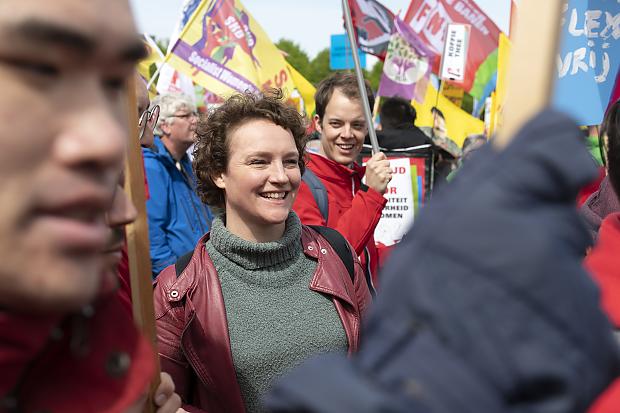Don't let Brussels play the boss
Don't let Brussels play the boss

It could scarcely be more symbolic. On May 9, Europe Day, the great and the good of the European elite assemble in a picturesque village in Romania, the EU's most corrupt country, a country which is currently heavily interfering with the rule of law in order to enable politicians who have been found guilty of fraud to avoid punishment. An excellent place to have an informal chat about the future of the European Union. It could scarcely be more symbolic, but it could certainly also hardly be more cynical.
Renske Leijten
There's certainly something strange going on. Because just two weeks later, the people in every country of the European Union will vote on Europe's future. How bizarre is it that the future will already have been cooked up before the people have had a chance in the elections to say what they consider to be important?
To think about the future, you need to look at where we stand now and at the past. Is the European Union, as currently functioning, good for humanity, for animals and for the environment? Or does the whole thing simply revolve around the economy, around trade and power? Is this form of cooperation good for the member states? Who profits, and who provides those profits? And I don't mean in terms of monetary gain, but fundamental matters such as the rule of law, freedom of the press, freedom of organisation. Does the EU provide freedom for people who work in health care, in the town hall, or to the people's representatives in our national parliament?
If I answer these questions, then I have to give the EU a grade of 'completely unsatisfactory'. Animals are just goods to be traded and are dragged about all over Europe. Countries such as Latvia, Lithuania and Romania want their young people, currently selling themselves as cheap labour in the west, to come home. In western countries, including our own, we are asking ourselves why our wages aren't rising. Home helps and health care for young people are groaning under the yoke of compulsory tendering which prioritises the short term. Health care, which offers security to vulnerable people, is being transformed into a commodity. The protection of land and dwellings from investors who are fouling up the housing market isn't allowed, because the dogma of freedom of capital prevents local elected representatives and decision-makers from defending their localities from vultures. Public services, such as public transport and energy are being tossed on to the market.
For the first time we are seeing a country abandon this form of cooperation, which should be enough to set alarm bells ringing. Yet nothing could be further from the truth. From Bratislava to Breda, from Leiden to Lisbon, the market must and shall be seen as a single unit.
This idea, that all countries of the European Union form a single market or that we are all one European people, sells us short. It ignores the differences that exist, positive differences, between cultures, languages, national histories, customs. Forced unity makes many people feel orphaned and lost. There's no way to break the power of Brussels, they think.
But that's just how things look. We can indeed move to a form of European cooperation with respect for each other's differences. The SP would like to make it possible not to go along with – or no longer to go along with - parts of the dogmatic and constricting market. If countries want to cooperate, that's great, but not if it's imposed.
So – back to Sibiu, that picturesque little village in corrupt Romania. The goal of the European elite is to have all its plans cooked up in advance. All of it – from the labour market, to the military, from the eurozone to the climate – has only one single direction: greater deepening of Europe and more power in Brussels.
At the end of this European summit a final declaration will be issued, listing intentions which will be further elaborated at ensuing European summits. In the Brussels jargon these are known as 'guidelines' for an incoming European Commission. Who drafts this final declaration? Corrupt Romania? Or the European Commission itself?
And most importantly: will the Netherlands sign up to it or will we listen to the people who vote on May 23rd?
